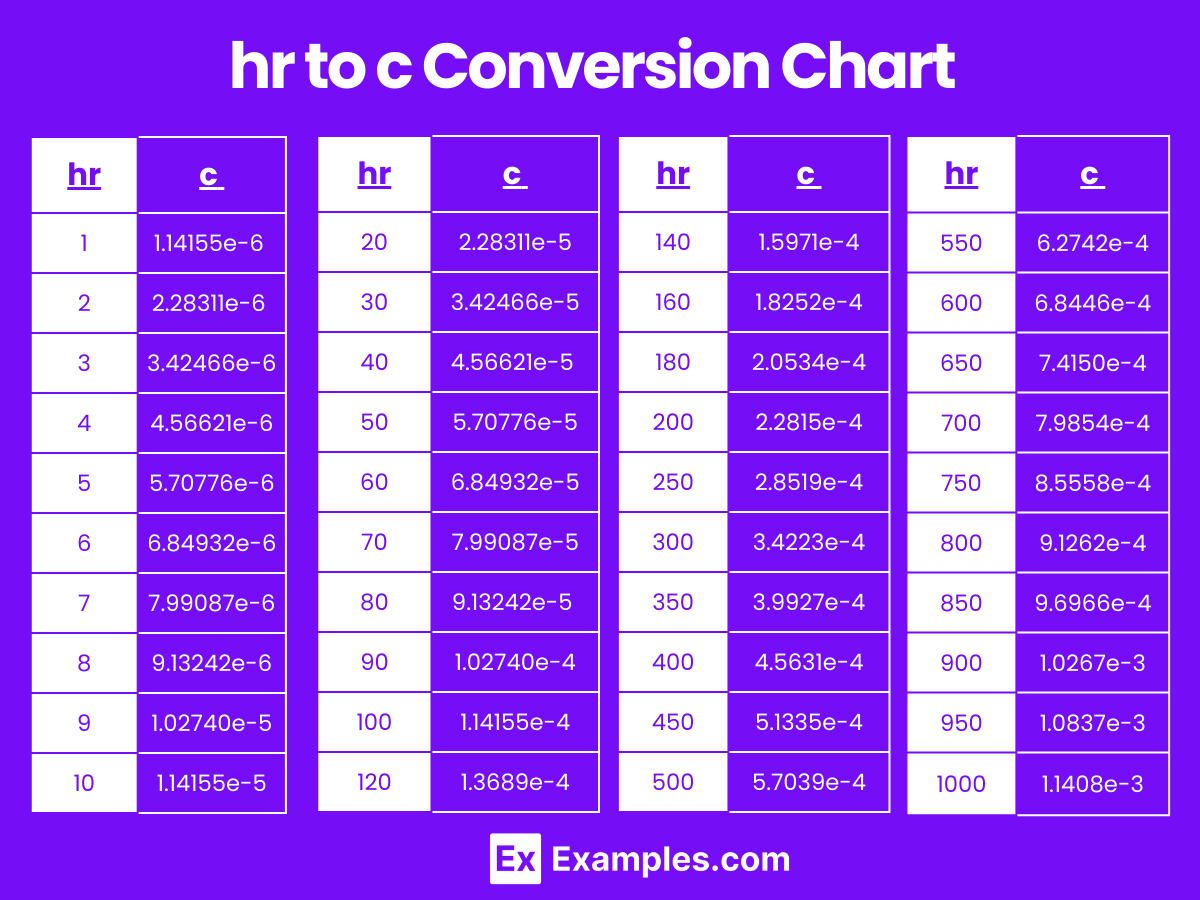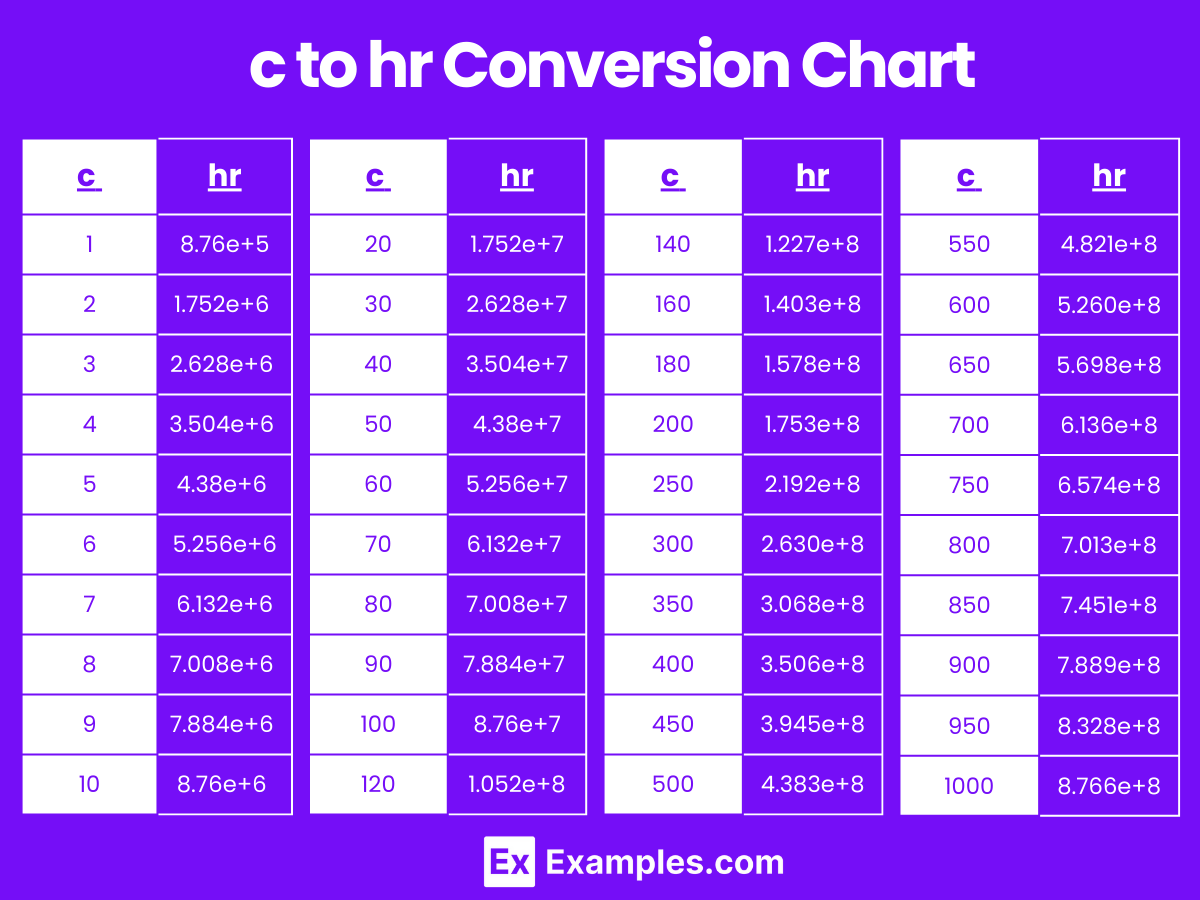Swiftly convert hours to centuries and vice versa at Examples.com. Enter your values for fast, precise results every time.
hr to c
Formula: Time in centuries(c) = Time in hours(hr) ∕ 876582
Hours :
Centuries :
| hours | centuries |
|---|---|
| 1 | 0.0000011407945862452116 |
c to hr
Formula: Time in hours(hr) = Time in centuries(c) x 876582
Centuries :
Hours :
| centuries | hours |
|---|---|
| 1 | 876582 |
Time Converters to Hour (hr)
| Nanosecond to Hour | Microsecond to Hour | Millisecond to Hour |
| Second to Hour | Minute to Hour | Day to Hour |
| Week to Hour | Month to Hour | Calendar Year to Hour |
| Decade to Hour | Century to Hour |
Time Converters to Century (c)
Conversion Factors:
- Hours to Centuries: 1 century = 876,000 hours
- Centuries to Hours: 1 hour = 1/876,000 centuries
How to Convert Hour to Century:
To convert hours to centuries, divide the number of hours by 876,000.
Centuries=Hours/876,000
Example: Convert 1,752,000 hours to centuries.
Centuries=1,752,000/876,000=2 centuries
How to Convert Century to Hour:
To convert centuries to hours, multiply the number of centuries by 876,000.
Hours=Centuries×876,000
Example: Convert 3 centuries to hours.
Hours=3×876,000=2,628,000 hours
Hour to Century Conversion Table
| Hours (hr) | Centuries (c) |
|---|---|
| 1 hr | 1.14155e-6 c |
| 2 hr | 2.28311e-6 c |
| 3 hr | 3.42466e-6 c |
| 4 hr | 4.56621e-6 c |
| 5 hr | 5.70776e-6 c |
| 6 hr | 6.84932e-6 c |
| 7 hr | 7.99087e-6 c |
| 8 hr | 9.13242e-6 c |
| 9 hr | 1.02740e-5 c |
| 10 hr | 1.14155e-5 c |
| 20 hr | 2.28311e-5 c |
| 30 hr | 3.42466e-5 c |
| 40 hr | 4.56621e-5 c |
| 50 hr | 5.70776e-5 c |
| 60 hr | 6.84932e-5 c |
| 70 hr | 7.99087e-5 c |
| 80 hr | 9.13242e-5 c |
| 90 hr | 1.02740e-4 c |
| 100 hr | 1.14155e-4 c |
hr to c Conversion Chart

Century to Hour Conversion Table
| Centuries (c) | Hours (hr) |
|---|---|
| 1 c | 8.76e+5 hr |
| 2 c | 1.752e+6 hr |
| 3 c | 2.628e+6 hr |
| 4 c | 3.504e+6 hr |
| 5 c | 4.38e+6 hr |
| 6 c | 5.256e+6 hr |
| 7 c | 6.132e+6 hr |
| 8 c | 7.008e+6 hr |
| 9 c | 7.884e+6 hr |
| 10 c | 8.76e+6 hr |
| 20 c | 1.752e+7 hr |
| 30 c | 2.628e+7 hr |
| 40 c | 3.504e+7 hr |
| 50 c | 4.38e+7 hr |
| 60 c | 5.256e+7 hr |
| 70 c | 6.132e+7 hr |
| 80 c | 7.008e+7 hr |
| 90 c | 7.884e+7 hr |
| 100 c | 8.76e+7 hr |
c to hr Conversion Chart

Difference Between Hour to Century
| Aspect | Hour (hr) | Century (c) |
|---|---|---|
| Definition | A unit of time equal to 60 minutes | A unit of time equal to 100 years |
| Measurement | Short-term | Long-term |
| Common Uses | Daily schedules, appointments, work shifts | Historical analysis, long-term planning, generational studies |
| Number of Minutes | 60 minutes | 52,596,000 minutes (assuming 365 days/year) |
| Number of Days | 0.0417 days | 36,500 days (assuming 365 days/year) |
| Number of Years | 0.00114 years | 100 years |
| Number of Hours | 1 hour | 876,000 hours |
| Symbol | hr | c |
| Time Perception | Immediate, short duration | Extended, long duration |
| Contextual Relevance | Specific events, precise timing | Broader trends, significant changes |
| Examples | Meeting duration, travel time | Historical periods, technological advancements |
1. Solved Examples on Converting Hour to Century
Example 1
Problem: Convert 87,600 hours to centuries.
Solution: Convert hours to centuries: Centuries=87,600 hours/876,000 hours/century=0.1 centuries
87,600 hours is equal to 0.1 centuries.
Example 2
Problem: Convert 1,752,000 hours to centuries.
Solution: Convert hours to centuries: Centuries=1,752,000 hours/876,000 hours/century=2 centuries
1,752,000 hours is equal to 2 centuries.
Example 3
Problem: Convert 438,000 hours to centuries.
Solution: Convert hours to centuries: Centuries=438,000 hours/876,000 hours/century=0.5 centuries
438,000 hours is equal to 0.5 centuries.
Example 4
Problem: Convert 8,760 hours to centuries.
Solution: Convert hours to centuries: Centuries=8,760 hours/876,000 hours/century=0.01 centuries
8,760 hours is equal to 0.01 centuries.
Example 5
Problem: Convert 438,000 hours to centuries.
Solution: Convert hours to centuries: Centuries=438,000 hours/876,000 hours/century=0.5 centuries
438,000 hours is equal to 0.5 centuries.
2. Solved Examples on Converting Century to Hour
Example 1
Problem: Convert 1 century to hours.
Solution: Convert centuries to hours: Hours=1 century×876,000 hours/century=876,000 hours
1 century is equal to 876,000 hours.
Example 2
Problem: Convert 2 centuries to hours.
Solution: Convert centuries to hours: Hours=2 centuries×876,000 hours/century=1,752,000 hours
2 centuries are equal to 1,752,000 hours.
Example 3
Problem: Convert 0.5 centuries to hours.
Solution: Convert centuries to hours: Hours=0.5 centuries×876,000 hours/century=438,000 hours
0.5 centuries is equal to 438,000 hours.
Example 4
Problem: Convert 3 centuries to hours.
Solution: Convert centuries to hours: Hours=3 centuries×876,000 hours/century=2,628,000 hours
3 centuries are equal to 2,628,000 hours.
Example 5
Problem: Convert 0.1 centuries to hours.
Solution: Convert centuries to hours: Hours=0.1 centuries×876,000 hours/century=87,600 hours
0.1 centuries is equal to 87,600 hours.
Is there a quick way to estimate centuries from hours?
Yes, for a quick estimate, remember that 876,000 hours equals 1 century. Dividing the total hours by 876,000 will give you an approximate number of centuries.
Are there tools available to help with the conversion from hours to centuries?
Yes, there are online calculators and conversion tools that can quickly convert hours to centuries and vice versa. These tools simplify the process and ensure accuracy in the conversion.
How accurate is the conversion from hours to centuries?
The conversion is quite accurate when using 365 days per year. However, for even more precision, consider leap years, where a year has 366 days. Over a century, there are typically 24-25 leap years, which slightly increases the total hours.
Why is it important to convert hours to centuries?
Converting hours to centuries can be useful for understanding long-term time spans and trends, such as historical events, technological advancements, and generational studies, which are often measured in larger time units like centuries rather than hours.
What are some practical applications of converting hours to centuries?
Practical applications include historical research, studying long-term trends, planning projects that span many years, and understanding generational changes.

